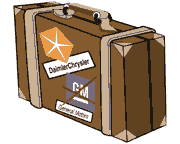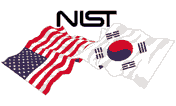Registrar Accreditation Suspension
Reveals Industry Problem As a result of
a surveillance audit in August 1999, the Dutch Council for Accreditation (RvA) suspended ABS Quality Evaluations Inc. (ABS QE) from Feb. 7, 2000, to April 10, thus preventing the registrar from issuing RvA-
accredited certification to ISO 9000, ISO 14000, QS-9000 and AS9000. RvA originally suspended ABS QE for a 90-day period. However, RvA lifted its suspension after just nine weeks when ABS QE complied with RvA's mandate
to adopt new auditor qualification standards, which differ from RAB and INMETRO's requirements. "At the heart of the dispute with RvA was their finding on an auditor qualification issue, wherein they
questioned our 10-year-old qualification procedures," explains Jim Wilson, president of ABS QE. "Within months of the RvA audit, we had been audited by the RAB, and in January we were audited by INMETRO, using the same
qualification standards we always have." RvA's decision to suspend ABS QE's accreditation could affect a host of other U.S. registrars that consider auditors qualified to audit to a particular SIC or
NACE code if the auditor has an educational background related to the client's industry, related work experience or experience auditing (or observing auditing) related organizations. "For the last criterion, we're using
a minimum threshold of four audits," explains Wilson. "Those are the same requirements we and other U.S. registrars have been using for some time now, and we've been regularly audited by all three of these bodies with
no problems in the past. The RvA position is now that auditors need to have any two of those three qualifications instead of any one." In addition, a multilateral agreement between members of the
International Accreditation Forum (IAF) requires a certain level of assumed equivalency between accreditations by RAB, RvA and INMETRO. However, according to Peter Tempelman, RvA's account manager for ABS QE, the IAF
agreement does not require RvA to accept ABS QE's auditor qualification because two other accreditation bodies had. "Such exceptions are made at our discretion to relieve the strain and cost of a redundant audit," says
Templeman. During the nine-week suspension, ABS QE submitted several corrective action proposals to RvA. "We initially suggested that we extend the number of required audits from four to eight,"
explains Wilson. "However, each time we would offer an alternative resolution without the two-of-three requirement, it was rejected. We also suggested they grandfather the auditors we'd been using for some time, but to
no avail. Finally, when we agreed to their demands, the suspension was lifted. "While some of our competitors use auditors who have inspection backgrounds, we primarily use engineers. This RvA
decision could potentially lead registrars to lay off very qualified auditors with ample experience." More than half of ABS QE auditors have been subjected to changes in their qualification assessments due to the RvA
decision. Following the dispute with RvA, Wilson met with the CEO, the president and the director of RAB to discuss the U.S. accreditation body's position on auditor qualifications.
At press time, Wilson confirmed that he had scheduled a meeting with RvA officials in May and planned to appeal their decision. RvA confirmed the dates of ABS QE's suspension, but declined to confirm
or deny the reason for disciplinary action. During the suspension, Wilson says his company issued hundreds of certificates without the RvA mark. According to Wilson, those companies that originally
requested RvA-accredited certification will be issued new certificates whose dates cannot overlap with the dates of the RvA suspension. RvA Suspension Leads to Registrar Investigation According to industry sources, RvA initiated its investigation of ABS QE after receiving a tip that the
registrar may have issued certificates with the RvA mark during the suspension period. ABS QE President Jim Wilson claims that the investigation ultimately found the allegations groundless. "There
were absolutely no certificates with the RvA seal issued during the suspension," maintains Wilson. He says the investigation resulted from misinterpreted data contained in certification reports the registrar regularly
turns over to the press, including Quality Digest. Additionally, the issue may be obscured by the RvA's own notice of suspension, which required ABS QE to continue to service clients working
toward or renewing RvA-accredited certification. At issue are the limits of that service. The result of the RvA investigation may hinge on whether ABS QE was allowed to issue RvA-accredited renewal and/or
scope-expansion certificates. RvA officials declined to discuss the specifics of the investigation, but did confirm that the investigation was initiated after "industry sources" brought the possible
violation to the attention of the RvA. Peter Tempelman, RvA's account manager for ABS QE, says that all suspensions resulting from like inquiries are listed on the RvA Web site at
www.rva.nl .
At press time, no such mention of ABS QE had been posted. Although Wilson says the issue has been decided and no disciplinary action has resulted or will result from the RvA investigation, Tempelman says the inquiry has not been formally closed.
 Koalaty Kid Koalaty Kid
Keeps Growing
and Growing
This year's Koalaty Kid Conference, sponsored by the
American Society for Quality (ASQ), attracted its greatest turnout ever when more than 300 teachers and nearly 100 students poured in from all over the United States, Canada,
Columbia, Bolivia, Brazil, Norway, Germany, the Netherlands and Sweden. The 11th annual Koalaty Kid conference was held in Sacramento, California, April 2–4.
The biggest news at the event was created when a business partner to the Koalaty Kid program, Lodi Gas Storage in Lodi, California, announced it will
contribute $415,000, the largest donation granted to the program since its inception six years ago. Lee Jenkins, superintendent of the Antioch Unified School District in Antioch,
California, presented the conference keynote. Following the keynote, attendees had their choice of multiple sessions. Some were student team presentations by youngsters ranging from the early primary
grades to the 12th grade. Having the students at the conference was something new, and the change was warmly received. In prior years, the conference
attendees were bused to the participating schools where they were able to witness the team and other presentations.
The Koalaty Kid program is a system for continuous improvement in a "can do" atmosphere. This student-centered approach aims at creating a school
environment where all students sustain enthusiasm for learning, behave responsibly, feel proud of themselves and their achievements, and strive to meet high standards.
To achieve these ends, Koalaty Kid embraces both the spirit and the substance of total quality, a systematic approach to continuous improvement.
School teams apply the principles and tools of quality to make the changes they deem important. At the same time, Koalaty Kid emphasizes a positive school environment.
There are hundreds of Koalaty Kid schools throughout North America. Sponsors include businesses, institutions and ASQ sections that provide expertise, volunteers and funding.
Steve Mullins, manager of the Koalaty Kid program, says: "Koalaty Kid embraces both the spirit and the substance of 'Total Quality,' a systematic
approach to continuous improvement. School teams apply the principles and tools of quality to make the changes they deem important."
The next Koalaty Kid conference is scheduled for April 1–3, 2001, in Raleigh, North Carolina. To learn more about Koalaty Kid, contact ASQ at (800) 248-1946 or (414) 272-8575, e-mail koalatykid@asq.org or visit koalatykid.asq.org .
ASQ Calls for Comments on Revising ANSI/ASQ Z 1.9 The Statistics Division of the American Society for Quality (ASQ) is
reviewing and updating the American National Standards Institute (ANSI)/ASQ Z 1.9 (1993) Sampling Procedures and Tables for Inspection by Variables for Percent Nonconforming standard. Z 1.9 establishes
sampling plans for inspection by U.S. variables for use in procurement, supply and storage, and maintenance operations. It's the principal variables
acceptance-sampling standard and is referenced extensively in procurement contracts and in statistical quality control literature.
Those qualified to do so are encouraged to participate in the review process. The standard allows sampling with reduced sample size over its attributes counterpart Z 1.4,
Sampling Procedures and Tables for Inspection by Attributes, which is used to achieve efficiency and economy of variables sampling.
If you are interested in taking part in the review process, contact Herbert C. Monnich Jr. by e-mail at canink@hal-pc.org . For more information, contact
ASQ Standards Group Communications Coordinator Robin Gildersleeve at (703) 680-1436 or informintl@erols.com .  DaimlerChrysler Hires Away DaimlerChrysler Hires Away
General Motors' Chief Quality Guru
In mid-May Thomas LaSorda, General Motors Corp.'s vice president of quality, was named the head of the company's new task force to
improve GM's quality performance. Meanwhile, DaimlerChrysler had just begun listing on the Internet job vacancies at company locations throughout the world. But when it
came time to find a new senior vice president in charge of manufacturing for engines and transmissions, as The Wall Street Journal recently reported,
DaimlerChrysler did it the old-fashioned way: it hired LaSorda away from its competitor. LaSorda, 45 years old, is best known for planning and starting GM's plant in
Eisenach, Germany, in the early 1990s. The Eisenach plant, which was the model for later GM plants in Thailand, China, Argentina and Poland, borrowed heavily on the lean manufacturing techniques employed in the Toyota
production system decades ago. "Eisenach was used as the mother foundation for the sister plants," Eisenach, then GM's vice president of quality, reliability and competitive operations, said
in December 1998. GM's Eisenach plant built on the lean manufacturing system by adding elements of what it called "team production" and "agile manufacturing." "The key is people working in teams," said LaSorda. GM
defined an "agile" manufacturer as one able to build a wide range of products on one set of infinitely flexible tools using intelligent computers.
LaSorda will in part fill the void left at DaimlerChrysler when Cynthia Hess, the company's former U.S. quality chief and one of the highest-ranking women
in the automotive industry, left last month to join Heartland Industrial Group, an investment fund that focuses on undervalued industrial companies.
Reflecting an increasingly great disparity between supply and demand, LaSorda and Hess are only the most recent senior automotive executives to jump ship in an industry in which such moves were once a rarity. According to The Wall Street Journal, GM did not immediately name LaSorda's successor, but officials say he leaves behind a team of
quality-improvement specialists to continue the company's quality effort.  U.S. and Korea Craft U.S. and Korea Craft
Standards Agreement
On May 9, U.S. Secretary of Commerce
William M. Daley and Republic of Korea Minister of Commerce, Industry and Energy Kim Young-ho signed an agreement designed to establish a new cooperative
relationship between the two nations. The memorandum of understanding (MOU) between the National Institute for Standards and Technology (NIST) and the Korean Agency for Technology and Standards (KATS) will help
harmonize standards, leading to reduced redundant product testing and other technical obstacles that can impede trade. "This MOU will foster cooperation—in the private and public sectors of both
the United States and Korea—that will ensure that the door of commerce between our two nations stays wide open," says Daley. The United States, he
noted, was South Korea's No. 1 trading partner as recently as 1998, when 22 percent of South Korea's imports and 17 percent of its exports were exchanged with the United States.
The agreement will pave the way for closer technical cooperation in three key areas: documentation standards, conformity assessment and
measurements—all of which influence market access and import and export flows. Among the activities planned by the signers of the MOU are:  Joint or cooperative programs and projects of mutual benefit Joint or cooperative programs and projects of mutual benefit
 Mutual cooperation in international and regional organizations on matters in the three key areas Mutual cooperation in international and regional organizations on matters in the three key areas
 Freer exchange of technical data and information in the three key areas Freer exchange of technical data and information in the three key areas
 Organization of and participation in conferences, symposia, workshops and
other joint meetings of mutual interest and operation of joint training and education programs to raise competency in the three key areas Organization of and participation in conferences, symposia, workshops and
other joint meetings of mutual interest and operation of joint training and education programs to raise competency in the three key areas
As members of the Asia-Pacific Economic Cooperation, the United States and Korea have committed to creating a free and open trading system.
In meetings beginning on May 10, NIST and KATS representatives will identify priorities for exchanges of technical data, training and other activities of
mutual interest. Conformity assessment is expected to be one of the primary topics of discussion. Industry groups in many nations and regions have cited
duplicative or conflicting conformity assessment requirements as hindering global trade. 
Laser Measurement Riegl USA of Orlando, Florida, has launched its new North American Web
site to provide various industries with the latest technological advancements and industry applications for the company's safe, cost-effective, noncontact
laser range finders. Riegl manufactures a complete line of pulsed laser range finders for distance, level and speed as well as peripheral positioning and scanning equipment.
www.rieglusa.com Performance Improvement
Empowered Performance, a worldwide management education and consulting firm, recently launched its redesigned Web site, which includes a current
schedule of the principals' speaking engagements, a client list and company background information. Visitors will also find a password-protected "Clients
Only" area with feature articles and proprietary manufacturing process redesign information for downloading. Also available are downloadable files from
speaking engagements, a subscription offer for a free e-newsletter and more.
www.empoweredperformance.com Benchmarking Knowledge Exchange Annual membership in the Global Benchmarking Council (GBC) is designed to
provide an integrated set of solutions for any professional engaged in benchmarking, quality or process-improvement initiatives. The organization's
recently updated members-only site offers a comprehensive online database of GBC members who can serve as valuable networking contacts and access
points, online communities of companies involved in benchmarking projects, downloadable meeting summaries, a bulletin board to facilitate continual knowledge exchange, and a reference database of existing research and
metrics.
www.globalbenchmarking.com QS-9000 Courses
Two universities, the Michigan Virtual Automotive and Manufacturing College and Eastern Michigan University (EMU), have jointly developed two
QS-9000 courses to be delivered online. "Understanding QS-9000" is a four-hour course that provides a basic overview for general workers who need
to know their responsibilities in meeting quality standards. The second course, "Internal Quality System Auditing," is tailored for personnel responsible for
maintaining and improving their organization's quality management system. Employers interested in either course can review the class outlines posted at
the Web sites. Registration can be done through EMU. Corporate discounts are available.
www.mvac.org or
www.ceterforquality.org To submit your Web site for consideration, e-mail a description of its content to contact_us .
Because of space constraints, not all Web sites can be published. More quality-related links are available at www.qualitydigest.com.
Partnerships Adept Technology Inc., a leading supplier of factory automation products, has
announced an agreement between its Japan Division and Sony Corp. to give Adept licensing rights for Sony's Design for Assembly/Disassembly Cost Effectiveness (DAC) Technology. When Adept links the technology into its
Production PILOT process planning and design software, it will mark the first time assembly-process knowledge has ever been embedded in a 3-D digital mock-up environment.
www.adept.com or www.silma.com CEBOS, the maker of MQ1 quality management software used to help
industrial customers attain ISO 9000, QS-9000 and Tooling and Equipment certification, has partnered with DataNet Quality Systems to expand its flagship product to include DataNet's WinSPC software. The deal broadens
MQ1's scope to cover all 20 elements of the aforementioned standards in an easy-to-use Windows-based quality management system.
www.cebos.com or www.winspc.com People
The U.S. Department of Commerce has named Alan P. Balutis, who's been with the department for 21 years, director of the National Institute of Standards and Technology's (NIST) Advanced Technology Program (ATP).
Balutis replaces Lura Powell, who retired in September 1999 after five years in the position. The ATP provides cost-shared funding to industry-led R&D
projects that are selected for their innovation, risk and potential broad impact on the community.
www.nist.gov Recognition Quad Systems Corp. has been awarded the 1999 SMT Magazine Vision Award in the Pick-and-Place Equipment category for its Quad Meridian
Series. The Vision award recognizes products in the surface-mount technology industry that serve as benchmarks of excellence. The Quad Meridian Series is
featured along with other award-winning products in the May issue of SMT.
www.quad-sys.com Acquisition Rockwell Automation has acquired Systems Modeling Corp., a Pittsburgh-based developer of shop floor scheduling, simulation and modeling
software. The transaction will allow customers additional flexibility in integrating information throughout the enterprise while providing additional products and
expertise for the Rockwell Automation Manufacturing BusinessWare initiative.
www.rockwell.com Online Training The Quality, Engineering & Manufacturing Association (QEMA) has launched
a series of online training courses to help companies significantly reduce the cost of training employees require when seeking certification to ISO 9000, QS-9000, AS9100 and ISO 14000. Able to be taken from home or the
office, the courses include system overviews, implementation, internal quality auditing and documentation. The courses can be administered by QEMA or a
company training officer. Contact Ray Pfeffer at (602) 257-8884, ext. 3, for more information.
www.qema.com
To have your news item considered for publication in Quality Digest's "At a Glance" section, e-mail press releases to contact_us . |